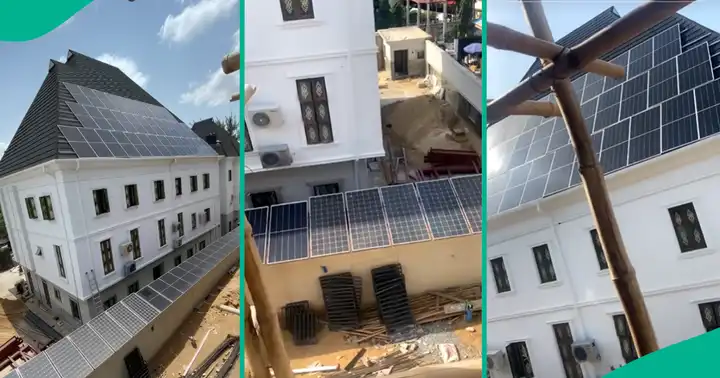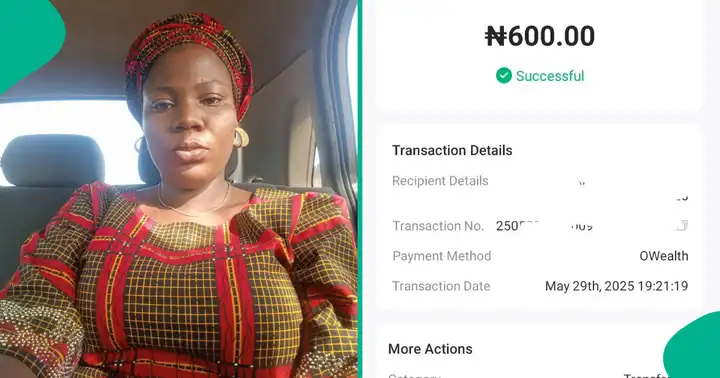In a time when millions of Nigerians are grappling with erratic electricity supply and rising energy costs, one homeowner has taken a bold step toward energy independence—by covering not only his roof but also the fence of his mansion with solar panels. The remarkable installation, captured in a viral video shared by @lutechrenewablepo on social media, has sparked widespread debate and admiration across the country.
This eye-catching solar project demonstrates not just innovation, but a growing shift in how Nigerians are beginning to take energy matters into their own hands—literally.
Turning the Entire House Into a Solar Power Station
The video, which showcases a stunning two-storey mansion, features solar panels installed on virtually every available surface of the building’s structure—from the top of the roof to the surrounding fence wall. Unlike typical solar setups where panels are mounted exclusively on rooftops, this unique approach pushes the limits of design and solar engineering.
For many, the most surprising element wasn’t just the roof-mounted panels, but the solar arrays embedded into the home’s perimeter fence. While unconventional, the decision was strategic.
According to the installer, the fence-mounted panels were positioned in such a way that they receive optimal sunlight throughout the day. He explained that though some fence panels may get temporary shade in the early morning, they still generate significant energy by the time the sun is fully up—and the batteries are often already fully charged before midday.
“This Guy and NEPA Nor Get Any Connection for the Next 20 Years” – Nigerians React
The viral footage attracted hundreds of comments from intrigued Nigerians. Some expressed awe at the setup and its potential for uninterrupted power supply.
“This guy and NEPA nor get any connection for the next 20 years,” one social media user wrote, referencing Nigeria’s often unreliable electricity provider.
Another commenter said:
“This is the level of planning we need. He won’t be worried about fuel, diesel, or power outages ever again.”
However, not all reactions were praise. A few individuals questioned the practical value of placing panels on fences, raising concerns about shading, durability, and aesthetics. Others suggested alternative placements, like creating a solar carport or pergola instead.
Still, the general sentiment was clear: this is the kind of innovative thinking Nigeria needs more of.
Expert Opinion: Is Fence-Mounted Solar Practical?
To help explain the logic behind this novel approach, Legit.ng reached out to renewable energy specialist Kabiru Akindele. According to Akindele, installing solar panels on fences is indeed possible—as long as the orientation and direction of sunlight are properly factored in.
“Panels can generate energy even when not placed on roofs. What matters most is access to consistent sunlight,” Akindele explained.
He also estimated that, based on the visible inverter and the number of panels in the video, the setup could be running on a high-capacity inverter—possibly up to 20kVA. This means the solar power system is powerful enough to sustain multiple buildings or run large appliances like air conditioners, deep freezers, and water heaters simultaneously.
The Cost of Energy Freedom in Nigeria
Solar energy in Nigeria isn’t cheap—at least not upfront. Depending on the number of panels, battery type (lithium or lead-acid), and size of inverter, a complete off-grid system like the one shown in the video could cost anywhere from ₦6 million to over ₦20 million.
Despite the high investment, homeowners who have switched to solar often report massive long-term savings on fuel and utility bills. More importantly, they enjoy 24/7 electricity without depending on a failing grid or noisy generators.
One solar user recently shared his experience, saying:
“I installed my solar system for ₦6 million, and I haven’t bought fuel or had a blackout since. The peace of mind is worth every naira.”
A Growing Trend Among Nigerian Homeowners
This story is part of a larger trend sweeping across urban Nigeria. As the national grid struggles to meet demand and electricity tariffs continue to rise, more people are turning to solar energy as a sustainable and cost-effective alternative.
Many tech-savvy Nigerians are even choosing to build solar infrastructure into new homes right from the design stage. Installers now report increased demand for hybrid systems, where users can switch between solar, battery, and grid power, depending on availability.
The Federal Government’s introduction of energy financing schemes and solar incentives is also helping more citizens access renewable energy. NGOs, banks, and private firms are beginning to offer flexible payment plans and lease-to-own solar packages.
Conclusion: Innovation Lights the Way Forward
The sight of a mansion entirely covered in solar panels—roof and fence alike—might seem extreme to some, but to others, it represents hope. It shows what is possible when technology meets vision, and when homeowners take proactive steps to secure their energy future.
As Nigeria continues to battle power instability, stories like this will only become more common—and more inspiring.
The solar revolution is here. Will you be a part of it?
Want more stories like this? Bookmark our site for the latest updates on technology, lifestyle, and innovation in Nigeria!




